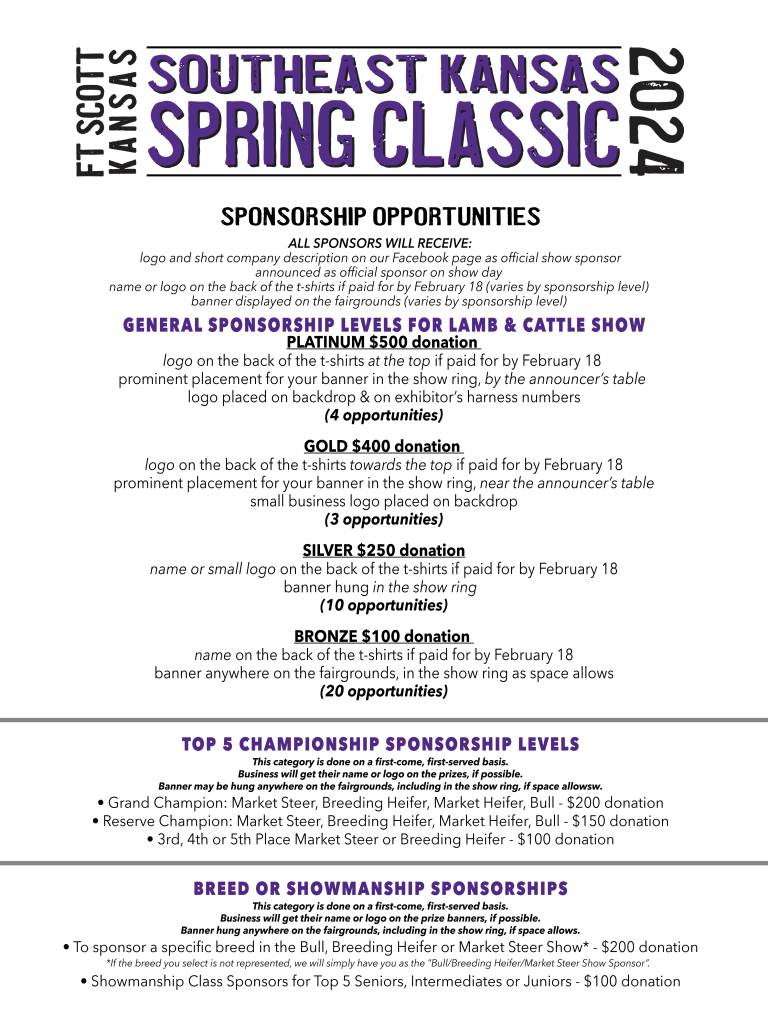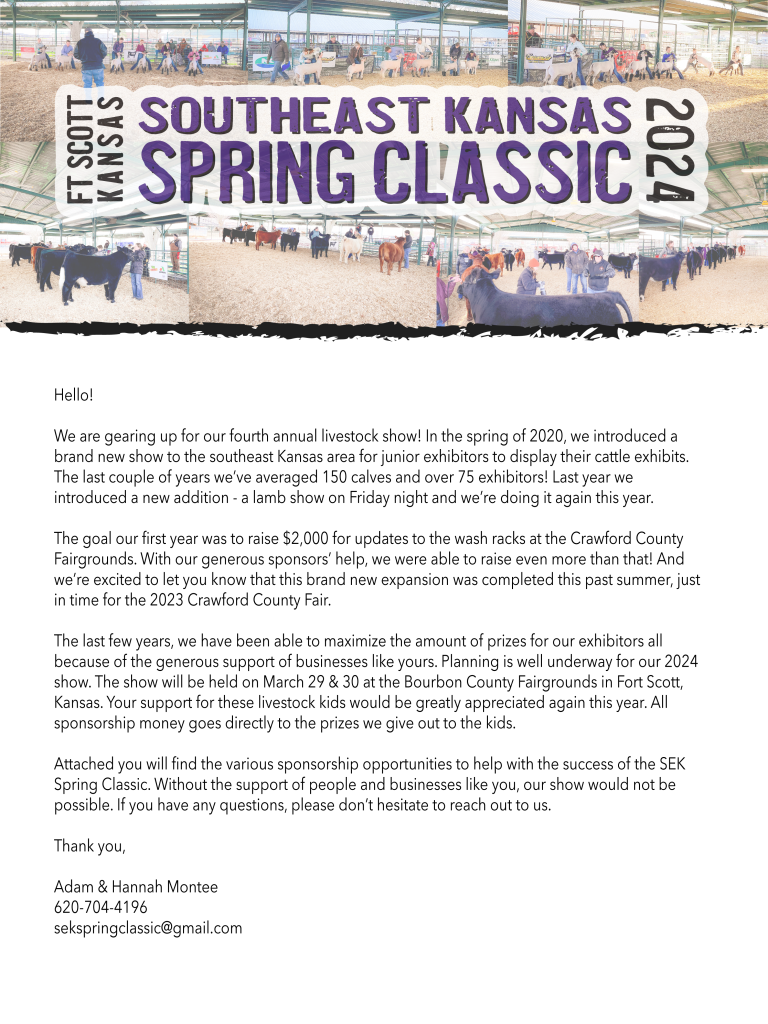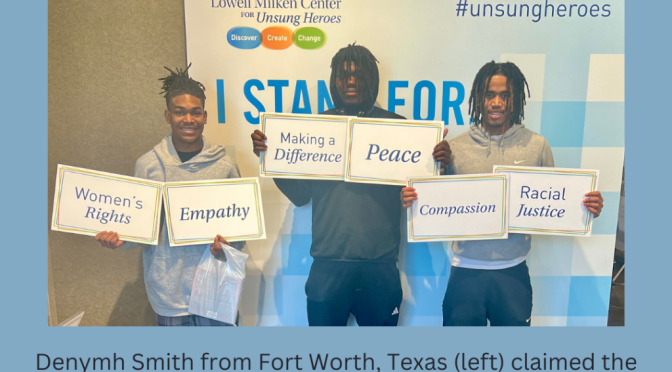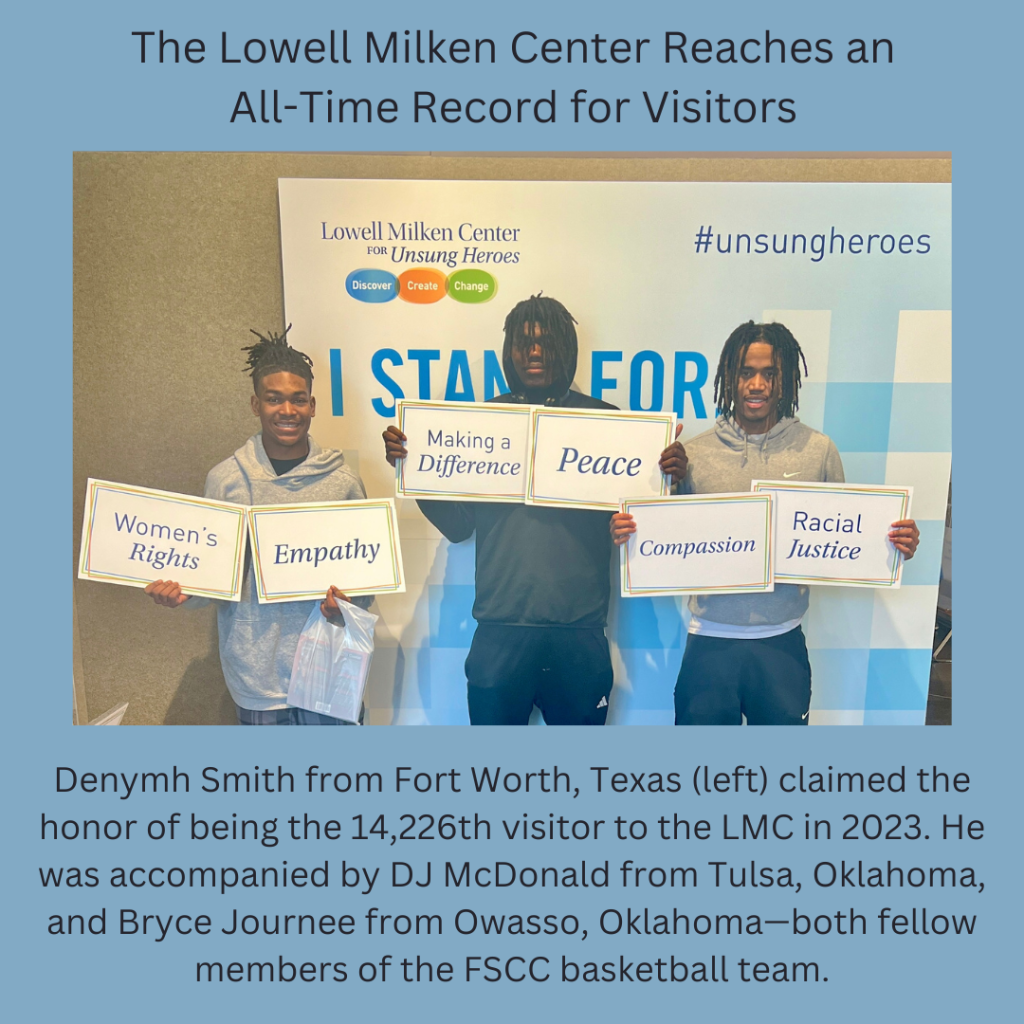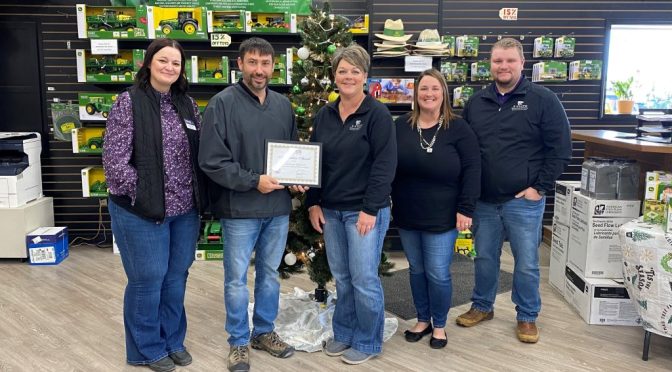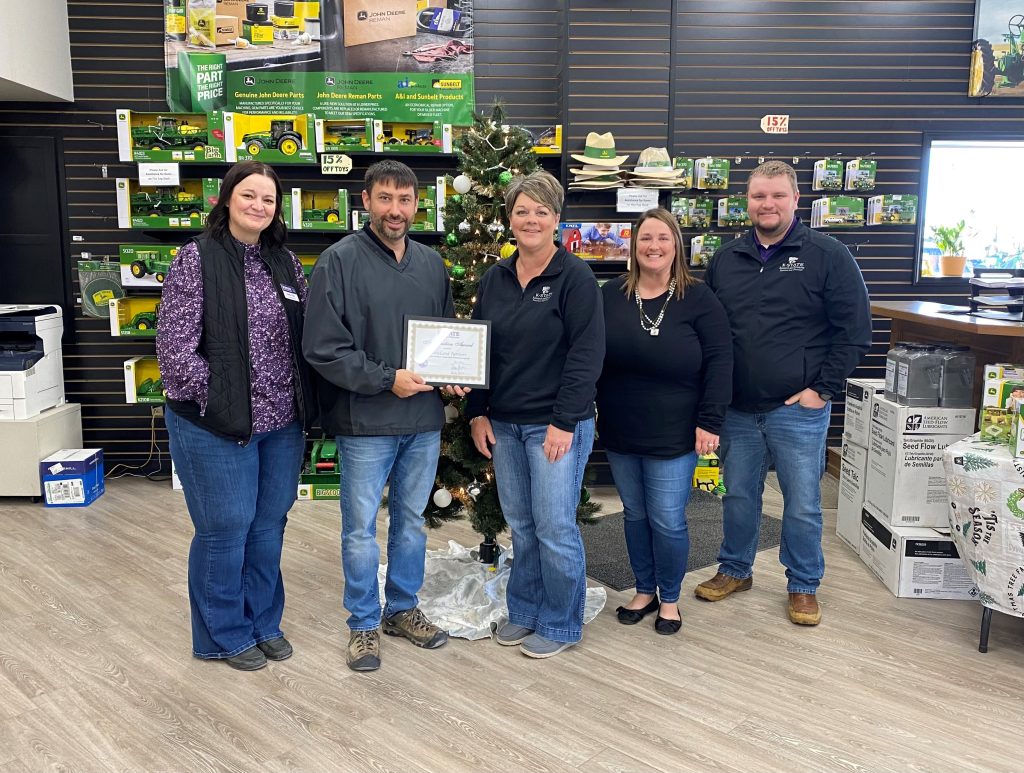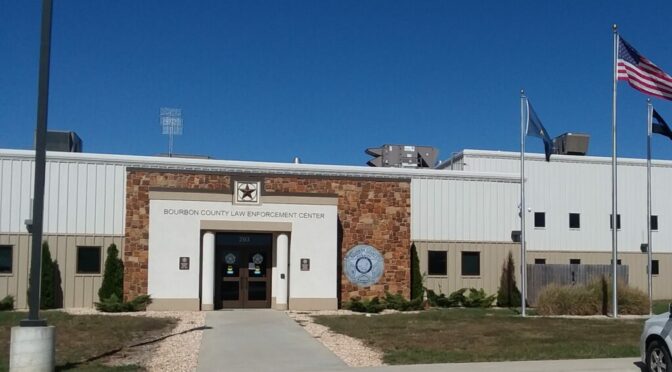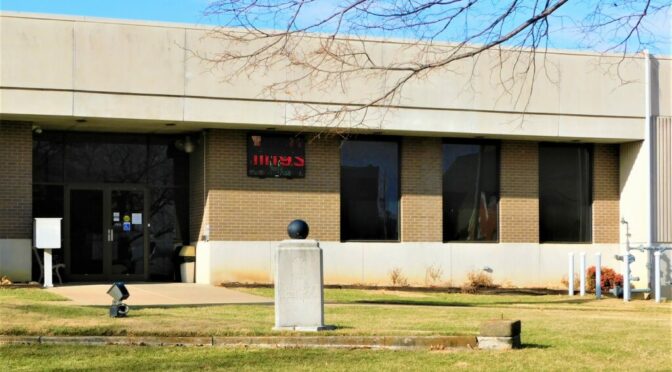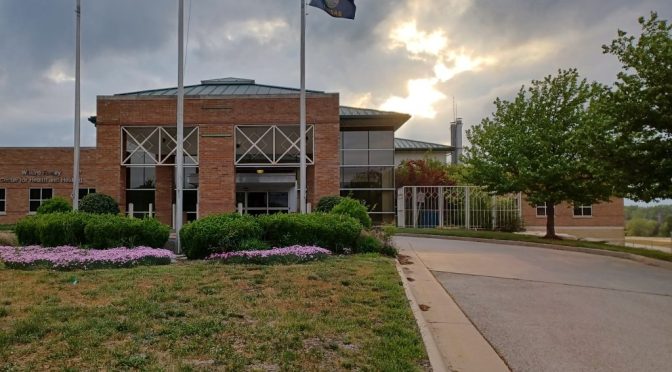All posts by Submitted Story
Lamb and Cattle Show is March 2024
Expanding Medicaid in Kansas
Governor Kelly Unveils Middle-of-the-Road Medicaid Expansion Legislation
~~Proposes Expanding Medicaid at No Additional Cost to Kansas Taxpayers~~
HOLTON – Today at Holton Hospital, Governor Laura Kelly unveiled the Cutting Healthcare Costs for All Kansans Act to expand Medicaid, a state and federal health insurance program, to an estimated 150,000 Kansans at no additional cost to state taxpayers. The commonsense legislative proposal builds on previous bipartisan Medicaid Expansion proposals to address Republican concerns, including by making the bill revenue-neutral.
The introduction of this legislation follows the months-long “Healthy Workers, Healthy Economy” tour in which the Governor rallied healthcare workers, farmers and ranchers, business leaders, faith leaders, and rural Kansans across the state in support of Medicaid Expansion. The bill would expand health coverage to working Kansans who currently make too much money to qualify for Medicaid but don’t receive health insurance through work or make too little to afford private health insurance.
“Each year I’ve been in office, I have introduced a bill to expand Medicaid with support from both sides of the aisle. The year, we’re going a step further to meet Republicans in the middle, putting forward a plan that would cut healthcare costs, create jobs, and grow our economy – all at no additional cost for Kansas taxpayers,” Governor Laura Kelly said. “We have taken such a bipartisan approach to incorporate what I’ve been hearing from Kansans during my tour and to reflect conversations we’ve had with Republican lawmakers. Now, there’s no excuse – at this point, every legislator standing in the way of Medicaid expansion is going against a commonsense, fiscally responsible proposal that benefits their constituents.
“As Governor Kelly’s ‘Healthy Workers, Healthy Economy’ tour highlighted, Medicaid expansion is an obvious solution to provide healthcare to hardworking Kansans and to support our hospitals,” said Ed O’Malley, President and CEO of the Kansas Health Foundation. “We appreciate that, by putting forward this measured proposal, Governor Kelly is clearly working to bring Republicans to the table. That’s what’s needed to get Medicaid expanded in Kansas.”
Addressing key Republican concerns, the Cutting Healthcare Costs for All Kansans Act:
Comes at no additional cost to Kansas taxpayers. The federal government pays for 90% of the costs to expand Medicaid, while states pay 10%. Under this proposal, the state’s 10% share is completely covered by drug rebates, a hospital fee, savings from higher reimbursement rates for existing Medicaid recipients, and additional federal funding. This does not include expected additional revenue from Kansas businesses boosted by a healthier workforce or reduced state expenditures on incarceration and state services because of a healthier population.
“My goal is to ensure Kansans’ tax dollars never go to waste, which is why I support this approach to expanding Medicaid,” said Kansas Senator Carolyn McGinn. “Right now, Kansans’ federal tax dollars are going to support hospitals and jobs in states like New York, California and every state adjacent to us instead of being invested in the people of Kansas.”
“It makes no sense to me that, while 40 other states have expanded Medicaid, we have not. Our tax dollars are going to every one of our neighboring states, while healthcare costs rise and hospitals close here in Kansas,” said Kansas Representative Dave Younger. “By including a work requirement and making sure Kansas taxpayers won’t pay for Medicaid expansion, this proposal addresses many of the concerns my Republican colleagues have had. Now, those in leadership positions need to let this topic be debated and voted on.”
Grows the Kansas workforce. This compromise proposal goes a step further than Governor Kelly’s other Medicaid Expansion proposals by including a work requirement for Medicaid enrollees to ensure Kansas’ workforce remains strong. There will be exceptions to this requirement, including for full-time students, full-time caretakers, veterans, and Kansans with medical conditions.
The bill will also reduce uncompensated care costs – the costs healthcare providers take on when uninsured patients can’t afford to pay a medical bill — which will allow providers to compete for healthcare workers in an environment in which all the states surrounding Kansas have now expanded Medicaid.
“This proposal addresses a lot of the concerns I’ve heard from Republican colleagues by including a work requirement and multiple funding streams to ensure Kansas taxpayers won’t foot the bill for Medicaid expansion,” said Kansas Senator John Doll. “I urge my Republican colleagues to join me in supporting this bill to ensure our rural hospitals stay open, to cut healthcare costs and lower taxes, and to get affordable healthcare to more working Kansans.”
Improves public safety. For too long, prisons and jails have been shouldering the burden of providing medical care to uninsured inmates at their own expense. Governor Kelly worked with the law enforcement community to include this provision so that law enforcement can redirect those resources to focus on keeping Kansans safe. This would also reduce pressure on local governments to increase property taxes for correctional healthcare costs.
“This bill provides relief for county jails like the Sedgwick County Jail, which have been burdened with covering the high costs of health care for uninsured inmates,” said Sedgwick County Sheriff Jeffrey Easter. “If this part of the expansion proposal were to pass, it would cut down on expenses for local taxpayers and ease up resources so our law enforcement can focus on public safety.”
”I support expanding Medicaid with this provision to include health coverage for recently admitted inmates,” said Douglas County Sheriff Jay Armbrister. “We have seen benefits and cost savings in working with local providers for having health care rates that match Medicaid. Doing so takes the financial and administrative burden of providing that care off counties and keeps our attention focused on our top priority: public safety.”
Language for the proposed Cutting Healthcare Costs for All Kansas Act is available here.
Background information about the proposed Cutting Healthcare Costs for All Kansans Act is available here.
Lowell Milken Center: All Time Record For Visitors
Southwind Extension District Appreciation Award 2023 PraireLand Partners
The Southwind Extension District is proud to recognize PrairieLand Partners in Iola for their outstanding support of the mission of K-State Research & Extension.
Prairieland Partners has been a large supporter of the 4-H program for many years.
Most recently, they graciously sponsored a multi-specie 4-H livestock “Barn to Ring” series that provided the opportunity for participants to learn livestock management and showmanship tips from top industry leaders.
PrairieLand Partners has also made purchases at the Allen, Woodson, Neosho and Bourbon county 4-H Livestock Premium Auctions.
The K-State Research and Extension Appreciation Award was authorized by Extension administrative staff in 1977. Its purpose is to honor a person, business or organization who has made outstanding contributions to extension programs in a county or district. The Southwind District Extension board and agents want to express their sincere gratitude to PrairieLand Partners for their support and look forward to partnerships yet to come.
Fort Scott Chamber of Commerce Announces Christmas Light Winners
The Fort Scott Area Chamber of Commerce announces the winners of the 2023 Christmas Light Contest with cash prizes sponsored by Niece Products.
Top Residential is awarded to three places:
1st Place: John Willis, 806 S. Barbee
2nd Place: Jordan Vansickle, 320 Sunset Drive
3rd Place: Carla Farmer, 2146 Jayhawk
Top Business is awarded to Mayco Ace Hardware Store, 205 Scott Ave.
Special recognition is also given to Clark Street Lights at 753 S. Clark Street who continue to have amazing displays this year for the community and visitors to enjoy.
The Chamber would like to thank everyone in the community who put up lights to make our town festive this holiday season.
Contact the Chamber for more information at 620-223-3566 or [email protected].
The Bourbon County Sheriff’s Office Daily Reports December 13
Bourbon County Commission Special Meeting Canceled for This Evening
The special meeting of the Bourbon County Commission on Wednesday, December 13, 2023 has been cancelled due to the unavailability of multiple individuals.
Bourbon County Commission Agenda for a Special Meeting on December 13 at 402 Woodland Hills Blvd.
Bourbon County Courthouse
210 S. National Ave Fort Scott, KS 66701 Phone: 620-223-3800
Fax: 620-223-5832
Bourbon County, Kansas
Nelson Blythe
1st District Commissioner
Jim Harris, Chairman
2nd District Commissioner
Clifton Beth
3rd District Commissioner
December 13, 2023 5:30 p.m.
A special meeting will be held at 5:30 p.m. on December 13, 2023 at 401 Woodland Hills Blvd.
- Call Meeting to Order
- Executive Session KSA 75-4319 (b)(4)
- Adjourn Meeting
Executive Session Justifications:
KSA 75-4319 (b)(1) to discuss personnel matters of individual nonelected personnel to protect their privacy.
KSA 75-4319 (b)(2) for consultation with an attorney for the public body or agency which would be deemed privileged in the
attorney-client relationship.
KSA 75-4319 (b)(3) to discuss matters relating to employer/employee negotiations whether or not in consultation with the
representative(s) of the body or agency.
KSA 75-4319 (b)(4) to discuss data relating to financial affairs or trade secrets of corporations, partnerships, trust and individual proprietorships
KSA 75-4319 (b)(6) for the preliminary discussion of the acquisition of real property.
KSA 75-4319 (b)(12) to discuss matters relating to the security measures, if the discussion of such matters at an open meeting
would jeopardize such security measures.
Avian Influenza Identified in McPherson and Rice Counties
MANHATTAN, Kansas — The Kansas Department of Agriculture, in conjunction with the U.S. Department of Agriculture’s Animal and Plant Health Inspection Service (USDA–APHIS), has identified highly pathogenic avian influenza (HPAI) in two egg layer facilities — one in McPherson County and one in Rice County. This marks five cases of HPAI in Kansas this fall; since the start of the outbreak in 2022 there have been 21 cases of HPAI in Kansas.
KDA is working closely with USDA–APHIS on a joint incident response at the affected premises in the two affected counties. According to KDA’s animal health officials, the facilities both increased their biosecurity upon the initial HPAI outbreak in 2022 and have been continuously monitoring their flock. Upon noticing clinical signs of HPAI in their birds, they immediately contacted KDA. The affected premises were placed under quarantine and the birds will be humanely depopulated and disposed of in an approved manner to prevent the spread of the disease.
In addition, KDA will be establishing a 20-km surveillance zone around the infected premises, and other farms or properties with poultry that fall within that zone will not be allowed to move birds or poultry products on or off their property without permission from KDA. The animal health team is working to locate all poultry owners in the area to ensure they know the symptoms of HPAI and are taking critical steps to protect their birds. If you own poultry and live in McPherson or Rice counties, please contact KDA at 833-765-2006 or [email protected]. You can also self-report your birds at https://fs22.formsite.com/
This outbreak of HPAI is primarily spread by migrating wild waterfowl, so a critical part of protecting your flock is to establish separation between your domestic birds and wild birds as they migrate through your region. Anyone involved with poultry production from the small backyard chicken owner to the large commercial producer should review their biosecurity activities to assure the health of their birds. Find guidance on biosecurity on the KDA Division of Animal Health webpage at agriculture.ks.gov/
Highly pathogenic avian influenza is a contagious viral disease that can infect chickens, turkeys and other birds and can cause severe illness and/or sudden death in infected birds. Poultry owners should attentively monitor your birds for symptoms of HPAI which include: coughing, sneezing, nasal discharge, and other signs of respiratory distress; lack of energy and appetite; decreased water consumption; decreased egg production and/or soft-shelled, misshapen eggs; incoordination; and diarrhea. Avian influenza can also cause sudden death in birds even if they aren’t showing other symptoms.
If these symptoms are observed in your birds, immediately contact your veterinarian. If you don’t have a regular veterinarian, contact KDA’s Division of Animal Health office toll-free at 833-765-2006.
According to the U.S. Centers for Disease Control and Prevention, the recent HPAI detections do not present an immediate public health concern or a food safety concern. As a reminder, the proper handling and cooking of all poultry and eggs to an internal temperature of 165˚F is recommended as a general food safety precaution.
For more information about HPAI, including current status of the confirmed cases in other states and more information about biosecurity for your flock, go to KDA’s avian influenza webpage at agriculture.ks.gov/
###
Santa Coming to Old Fort Auto This Saturday

|
|
|
|
|
|
|
|
|
|
|
|
|
|
|||||||||
|
The Low Income Energy Assistance Program opens two weeks early this winter.
TOPEKA – With temperatures dropping, the Kansas Department for Children and Families (DCF) announced today that Kansans needing financial assistance to keep their heat on this winter can apply for the Low Income Energy Assistance Program (LIEAP) earlier this year than in past years.
“Kansas winters can be brutal and no Kansas family should be cold,” said Laura Howard, DCF Secretary. “We are accepting LIEAP applications beginning Dec. 18, rather than the beginning of January as we have traditionally done.”
LIEAP helps Kansans restore or maintain energy services that heat their home. This includes electricity, natural gas, propane and other home heating fuels.
“We understand that applying for benefits can be complicated,” Howard said. “Beginning Dec. 18 through the end of March, DCF and partnering energy companies will be available to help Kansans gather information and submit their LIEAP applications.”
To attend an in-person LIEAP application event near you, visit LIEAP one-on-one support page. Kansans should have with them their identification, proof of income for all adult household members and current utility bills. Partnering energy companies, Atmos Energy, Black Hills Energy, Evergy, Kansas Gas Services and Midwest Energy, will be in attendance at most events in the areas that they provide energy services to Kansans.
Applications are accepted on-line at www.dcf.ks.gov, click “Apply for Services,” until 5 p.m., March 29. To qualify, households must have an adult at the address that is responsible for the heating costs of the home. Applicants be at or below 150% of the federal poverty level.
2024 Income Eligibility Guidelines
|
Persons Living at the Address |
Maximum Gross Monthly Income |
|
1 |
$1,823 |
|
2 |
$2,465 |
|
3 |
$3,108 |
|
4 |
$3,750 |
|
5 |
$4,393 |
|
6 |
$5,035 |
|
7 |
$5,678 |
|
8 |
$6,320 |
|
9 |
$6,963 |
|
10 |
$7,605 |
|
11 |
$8,248 |
|
12 |
$8,890 |
|
+1 $643 for each additional person |
|
Discover more information about LIEAP in Kansas including frequently asked questions, other community resources, and the complete list of LIEAP application events scheduled. Funding for LIEAP is provided by the U.S. Department of Health and Human Services, Office of Community Service through the Federal Low-Income Home Energy Assistance Program.
# # #
The Kansas Department for Children and Families (DCF) mission to protect children, strengthen families and promote adult self-sufficiency. DCF’s more than 35 service centers across the state offers a wide range of support services including food, utility, and child care assistance, child support services, and employment education and training. DCF also partners with grantees to provide foster care services to children including case planning, placement, life skills, and foster parent recruitment and training. DCF works in partnership with organizations, communities and other agencies to support families, children and vulnerable adults connecting them with resources, supports and networks in their home communities.

